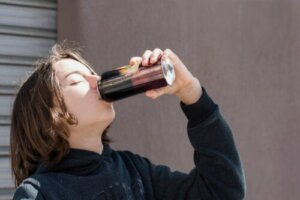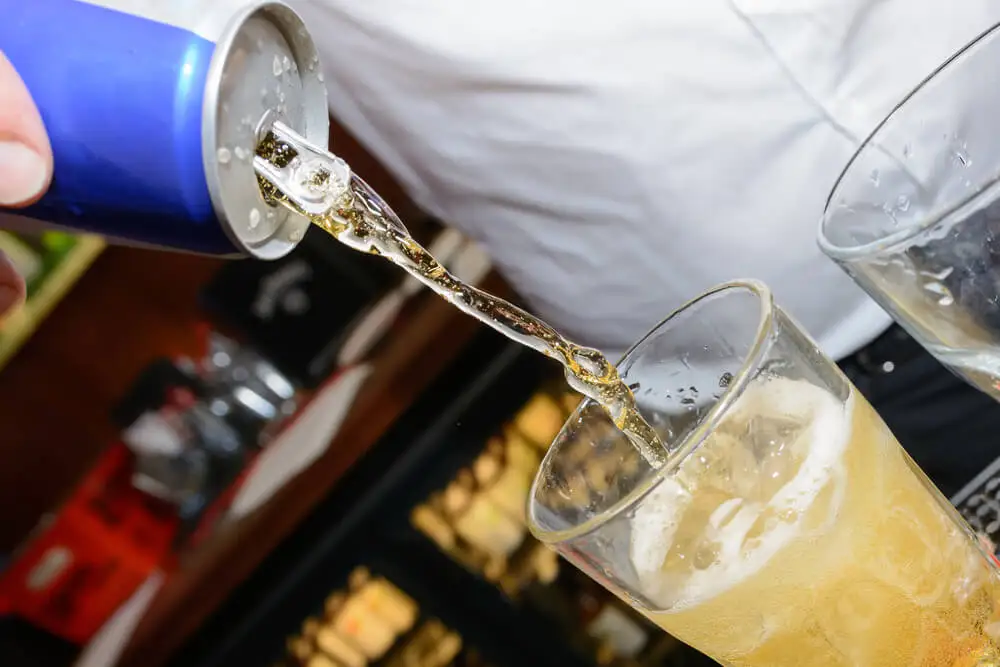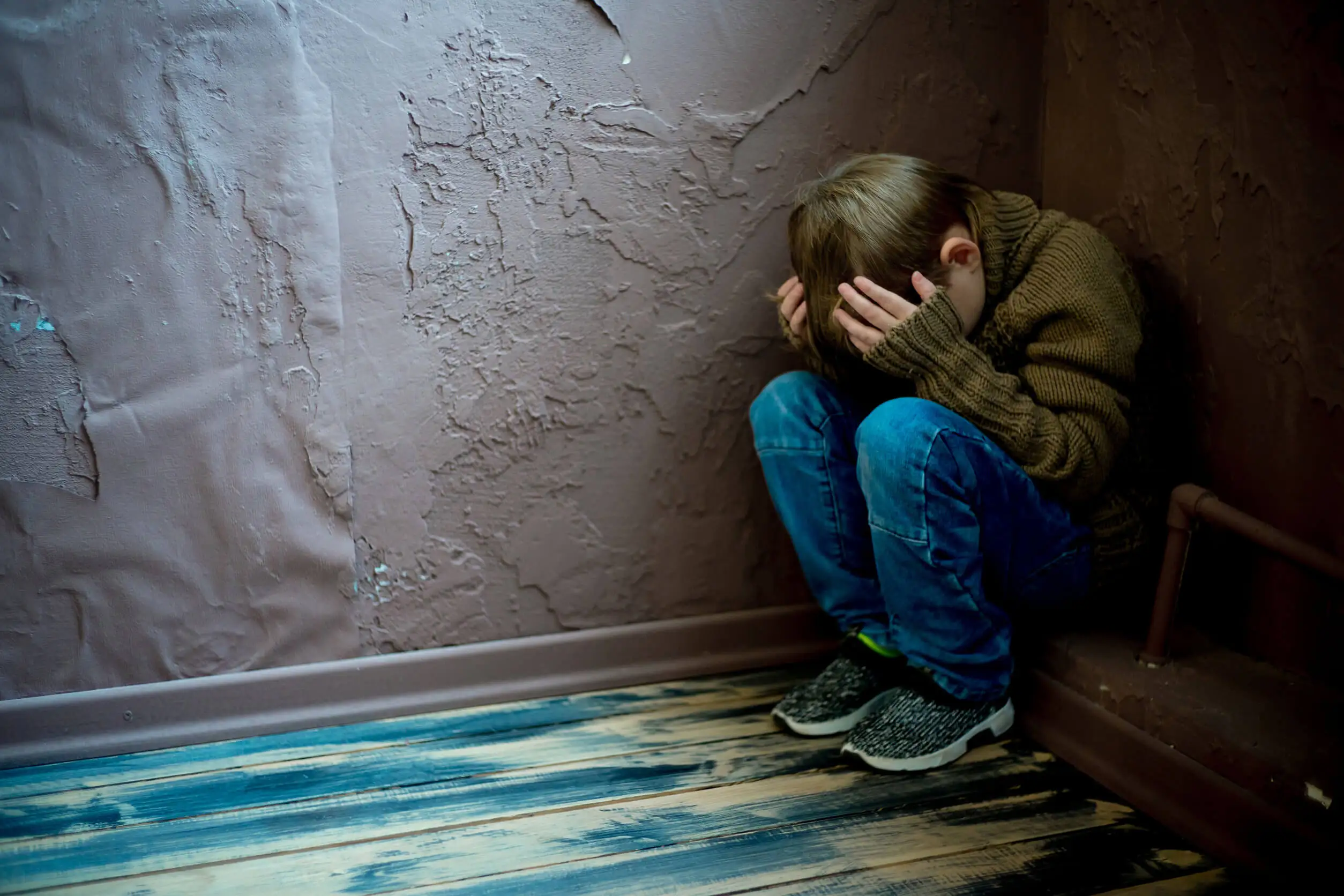Here's Why Children Shouldn't Consume Energy Drinks

The consumption of energy drinks has grown exponentially in recent years among children. These products are not healthy for anyone, but in minors, they have even more severe consequences. Unfortunately, it’s estimated that about half of regular consumers are under the age of 18.
Energy drinks contain stimulants. They include vast amounts of sugar, caffeine, and taurine, an enhancer of caffeine itself.
The substances that are present in energy drinks can harm the health of children and adolescents. Therefore, from a medical point of view, minors should never consume this type of product.
In this article, we’ll explain why.
What are energy drinks?
The first thing to say is that energy drinks are not the same as sports or isotonic drinks. Athletes use the latter to rehydrate and replenish sugar and minerals after a demanding physical activity.
Energy drinks, on the other hand, have a high content of stimulant substances. In particular, they have caffeine. In fact, each bottle contains between 27 and 164 milligrams of caffeine.
These drinks also contain compounds such as taurine and guarana, which enhance the effects of caffeine. They’ve also been credited with the ability to increase cognitive function or athletic performance. However, there is no solid scientific evidence to corroborate this.
Another thing is that the stimulant effect of these products generates these sensations. Be that as it may, energy drinks contain unsafe caffeine and herbal supplements that may also have stimulant effects.
The adverse health effects of energy drinks
These drinks have adverse effects on the nervous system and cardiovascular system. Generally speaking, the immediate consequences are usually disturbed sleep patterns and, paradoxically, an increased sense of fatigue.
Taurine has been associated with increased heart rate and agitation. Also, if there’s any previous anxious or manic disorder, the symptoms are exacerbated. On the other hand, the high sugar levels in energy drinks may increase insulin resistance.

Why are energy drinks not recommended for children?
Children and adolescents are developing individuals. Thus, the effects of these drinks can be more severe for them. In general, this age group is at greater risk of adverse events from the consumption of these products and long-term consequences.
Let’s see what they are.
You’ll definitely like this article: 8 Healthy Foods that are Trending in 2021
The immediate adverse effects
The adverse effects of these drinks are more common in children and adolescents. These include headaches, palpitations, nausea, vomiting, diarrhea, sleep problems, and seizures.
In a study conducted in Australia by the Telethon Kids Institute, it was established that 55.4% of children who were regular consumers of energy drinks had adverse events that required medical attention.
Behavioral problems
Another study published in Neuroscience Biobehavior reported behavioral problems in children and adolescents who consume energy drinks regularly. In general, they tend to be hyperactive and tend to engage in risky behaviors.
Plus, they also have more problems with behavior regulation and develop self-destructive behaviors. On the other hand, they’re more likely to consume alcohol and psychoactive substances as companions or mixtures.
Finally, they tend to eat less nutritious food and have more mood disorders. They may also perform less well in school and have poorer social skills.
Cardiovascular health
Research published by the American Heart Association (AHA) indicates that frequent consumption of energy drinks alters the heart’s electrical activity. This increases the likelihood of developing an abnormality called ventricular tachycardia.
The harmful effects of sugar
These drinks contain high levels of sugar. In principle, this facilitates the development of tooth decay. However, this is not the most harmful effect.
In reality, these compounds make children more prone to diabetes and obesity. It’s estimated that there are currently around 158 million obese children and adolescents in the world.
Intoxication
High consumption of energy drinks in children makes intoxication feasible. The consequences can be severe, with loss of consciousness, hallucinations, convulsions, strokes, and even sudden death. In many cases, giving up these drinks leads to withdrawal symptoms.

Alternative drinks
Many children and adolescents and a good number of parents confuse energy drinks with isotonic drinks. The first thing is to understand the differences and be aware that sports drinks should only be used after or during intense physical activity.
That said, every young athlete should be able to recover with pure water. If consumed in the correct quantity, there’s no risk of dehydration. It’s best to drink water every 15 to 20 minutes during physical activity.
However, if your child wants to drink something different, these can be good alternatives:
- Isotonic or sports drinks: These are drinks that contain carbohydrates and electrolytes, and a significant amount of calories.
- Vitamin waters: These drinks also often contain extra calories, caffeine, artificial sweeteners, and herbs. They’re not recommended, but are a slightly better alternative than energy drinks.
- Natural juices are a good option, as long as they’re low in sugar.
- Fresh fruits also help keep the body’s hydration balanced.
- However, water is still the healthiest alternative.
We know you’ll like to read: The Benefits and Importance of Choosing Seasonal Foods
Avoid advertising energy drinks for children
Finally, it’s essential to consult with your pediatrician about the drinks that children and adolescents usually consume. Good information is the best support for making good decisions in this area.
Manufacturers of these drinks often use very persuasive advertising aimed at children. If the legislation does not control this, the best thing to do is to talk to children so that they’re well informed and don’t allow themselves to be manipulated by these misleading messages.
All cited sources were thoroughly reviewed by our team to ensure their quality, reliability, currency, and validity. The bibliography of this article was considered reliable and of academic or scientific accuracy.
- Trapp Et. Al., G. (2018, 5 octubre). Call for a ban on the sale of energy drinks to children (<18 years of age) due to the significant negative impact these drinks have on children’s health. Telethon Kids Institute. https://www.nslhd.health.nsw.gov.au/HealthPromotion/Documents/cs.ccs.074.181005.sub.Telethon+Kids+Institute.pdf.
- Temple J. L. (2009). Caffeine use in children: what we know, what we have left to learn, and why we should worry. Neuroscience and biobehavioral reviews, 33(6), 793–806. https://doi.org/10.1016/j.neubiorev.2009.01.001.
- Shah Et. Al., S. (2019, 29 mayo). Impact of High Volume Energy Drink Consumption on Electrocardiographic and Blood Pressure Parameters: A Randomized Trial. JAHA. https://www.ahajournals.org/doi/full/10.1161/JAHA.118.011318.
- Contreras, K., & Villada, W. (2017). Efectos médicos del consumo de bebidas energéticas. Revisión de la literatura. Int. J. Med, 4(2), 1167-1173.
- Manrique, Clara Inés, Claudia Lucía Arroyave-Hoyos, and David Galvis-Pareja. “Bebidas cafeínadas energizantes: efectos neurológicos y cardiovasculares.” Iatreia 31.1 (2018): 65-75.
This text is provided for informational purposes only and does not replace consultation with a professional. If in doubt, consult your specialist.








